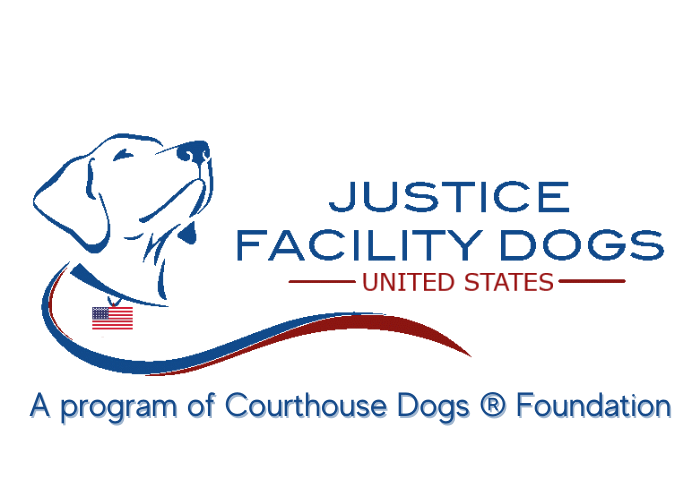 Justice Facility Dogs in California
Justice Facility Dogs in California

Tim Murphy
California State Coordinator
Justice Facility Dogs US

Jennifer Love
California State Coordinator
Justice Facility Dogs US
These agencies have professional handlers working with certified facility dogs in California.
Contra Costa District Attorney, Martinez (CCI)
Corona Police Department (CCI)
Downey Police Department (CCI)
East Bay Children’s Law Offices, Oakland (CCI)
Fullerton Police Department (CCI)
Glendale Police Department (CCI)
Hawthorne Police Department, Hawthorne (CCI)
Los Angeles County District Attorney, Los Angeles – 3 dogs (ADW)
Marin County District Attorney, San Rafael (CCI)
Mariposa County District Attorney, Mariposa (ADW)
Monterey County District Attorney, Monterey – 2 dogs (CCI)
Pomona Police Department (CCI)
Riverside County District Attorney (ADW)
San Bernardino District Attorney, San Bernardino – 3 dogs (ADW)
San Diego County District Attorney (Paws’itive Teams)
San Francisco CASA (CCI)
San Francisco District Attorney, San Francisco (ADW)
San Luis Obispo County District Attorney (CCI)
San Mateo District Attorney (CCI)
Santa Clara County District Attorney, San Jose – 2 dogs (ADW)
Seal Beach Police Department (CCI)
Stanislaus County District Attorney, Modesto (CCI)
Sutter County District Attorney, Yuba City (CCI)
Tulare County District Attorney, Visalia (ADW)
Tuolumne County District Attorney, Sonora – 2 dogs (NEADS, TLC)
Vandenberg Air Force Base Sexual Assault Prevention and Response (TLC)
Vacaville Police Department (CCI)
Ventura County District Attorney – 3 dogs (ADW)

Facility dog Raider, trained by Canine Companions
Appellate Court Decisions
People v. Chenault (2014)
227 Cal. App. 4th 1503, 175 Cal. Rptr. 3d 1 (2014)
Full text of the opinion here.
California Court of Appeal, July 11, 2014.
Review denied by California Supreme Court, October 15, 2014.
Nature of case:
Darrell Chenault was convicted of 15 counts of sexual offenses, committed against two of his daughters and two of his nieces. At the time of trial, the nieces were 11 and 13 years old.
Procedure in the trial court:
The prosecutor asked the judge to allow the presence of a support dog during the testimony of the two nieces (who were then 11 and 13 years old). The prosecutor relied on a California statute, Evidence Code § 765. That statute requires courts to take “special care” to protect a witness under the age of 14 from “undue harassment or embarrassment.”
The court took measures to reduce any possible prejudice to Chenault by setting forth logistics for the entry, positioning, and departure of Asta and the children during jury recesses so the dog was as unobtrusive and least disruptive as reasonably possible. Asta was also directed to sit in a chair near the back door.
Jury Instructions:
“[F.] and her sister [C.] in turn, will be accompanied by a service animal, companion dog, whose name happens to be Asta. The law permits the Court to make reasonable accommodations for child witnesses, and accordingly, I’ve granted the request for Asta to be present during the testimony of [F.] and [C.] And Asta will otherwise be a nonparticipant.”
Appellate decision:
The presence of a support dog does not violate the defendant’s constitutional right to a fair trial or to confront witnesses. A support dog is no more prejudicial than a support person. The California court rejected the standards by the Washington Supreme Court in Dye.
In deciding whether a support dog should be allowed, the judge should “focus on whether the presence of the specific support dog would likely assist or enable the individual witness to give complete and truthful testimony by reducing the stress or trauma the witness may experience while testifying in court or otherwise minimizing undue harassment or embarrassment.” Although express findings are preferred, implicit findings may be adequate.
If a dog is allowed, the court should make the presence of the dog as unobtrusive and undisruptive as reasonably possible. If the dog’s presence becomes known to the jury, the court should give an appropriate admonition to the jury.
In this case, the trial judge implicitly found that the dog’s presence was necessary. The judge took adequate measures to protect the defendant from possible prejudice. The instruction given by the judge effectively told the jury not to consider the presence of the dog in weighing the evidence and deciding the merits of the case. Although a more complete admonition would be preferable, this instruction was adequate. The judge therefore properly exercised his discretion under Evidence Code § 765.
People v. Spence (2012)
212 Cal. App. 4th 478, 151 Cal. Rptr. 374 (2012)
Full text of the opinion here.
California Court of Appeal, December 27, 2012.
Review denied by California Supreme Court, April 10, 2013.
Nature of case:
James Spence was charged with six counts of sexual offenses, arising out of two separate incidents. The victim was his 10-year-old stepdaughter. The jury convicted Spence on four counts.
Procedure in the trial court:
The victim asked to have Dory accompany her to the witness stand. The judge ruled that allowing a dog in the courtroom was comparable to letting the victim hold a teddy bear. Based on the judge’s previous experience with Dory, she believed that Dory would be almost unnoticeable once everyone was in place. The judge said that Dory would be removed from the courtroom if any issues or improper behavior occurred.
The victim was also accompanied to the witness stand by a victim advocate from the San Diego District Attorney’s Office.
Jury Instructions:
The jury was given a standard instruction to decide the case based on the evidence, not on any extrinsic factors such as sympathy, passion, or prejudice.
Appellate decision:
The defendant argued that the procedure at trial violated a California statute, Evidence Code § 868.5. That statute allows a witness to be accompanied to the witness stand by only one support person. The Court of Appeal held that Dory was not a “person,” so the statute was not violated.
The presence of the victim advocate and the support dog did not create any disruption or distraction, so as to violate confrontation clause protections. The court viewed the trial judge’s remarks as containing an implied finding of necessity. These findings were supported by the victim’s youth, her emotional response when interviewed by a doctor and nurse, and the prosecutor’s concerns that she would have an “emotional meltdown” on the witness stand. Assuming that more specific findings of necessity would have been proper, any error in this respect was harmless.
ADI Accredited Organizations
The following organizations place facility dogs in the state of California. Please visit their websites to find out more about each organization.
ADW – Assistance Dogs of the West

